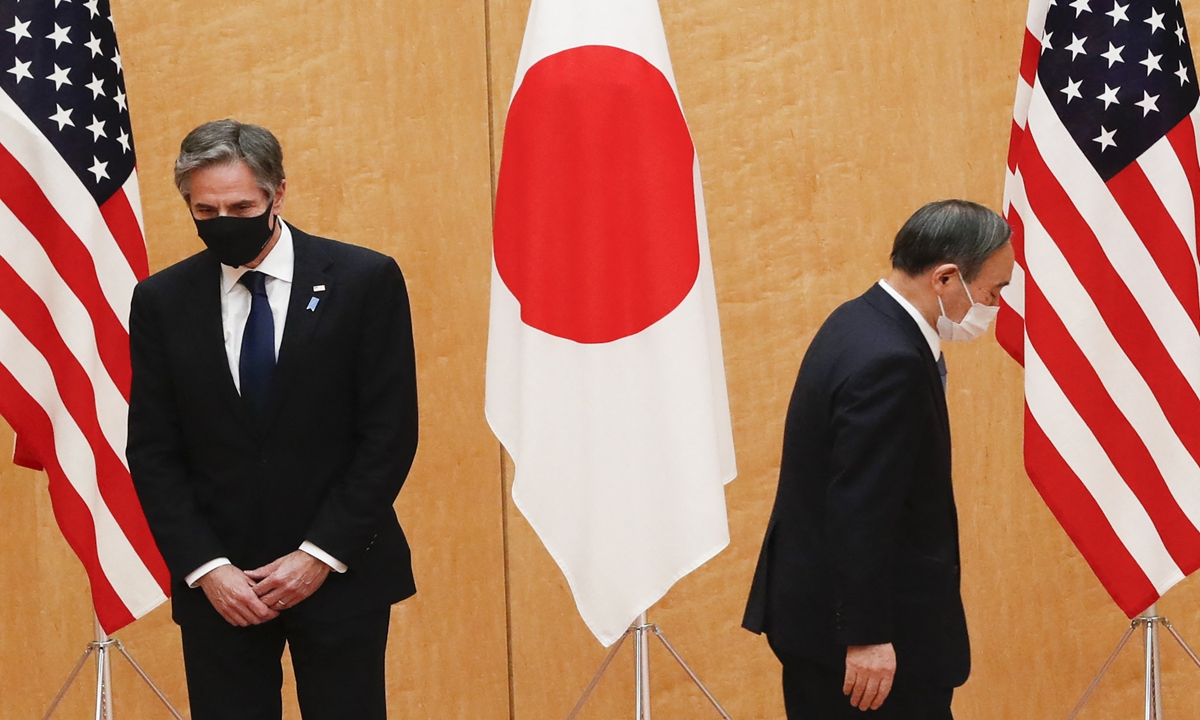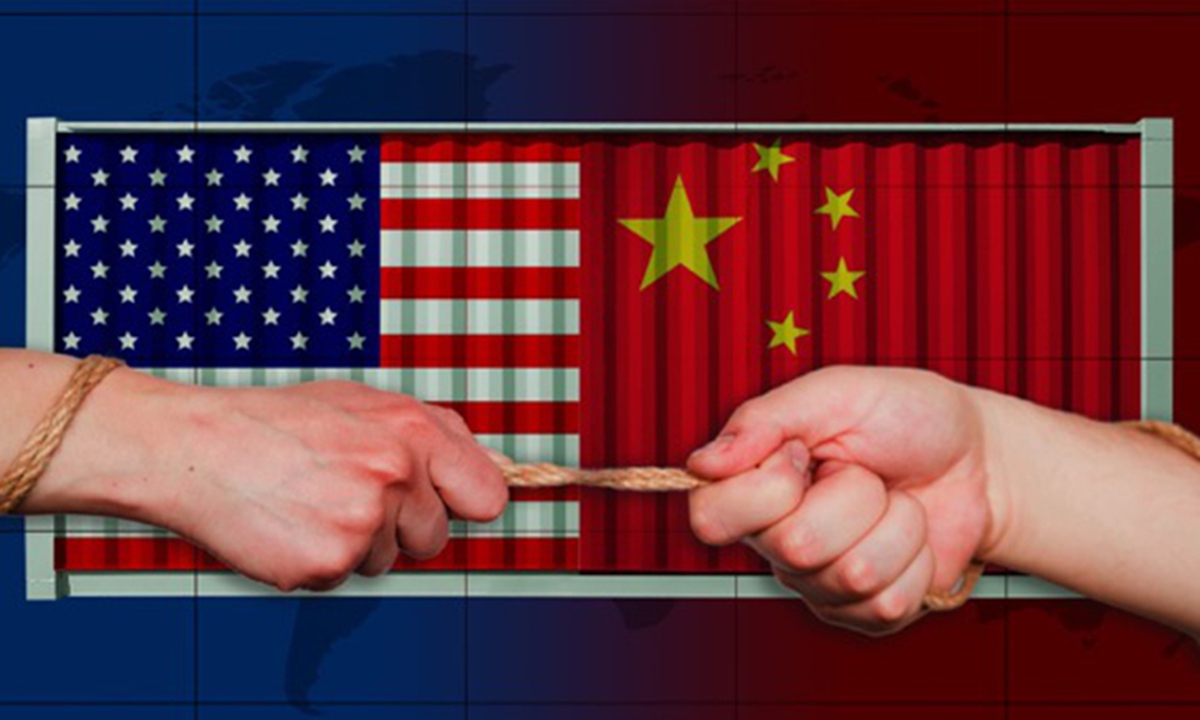
US Secretary of State Antony Blinken (L) meets with Japanese Prime Minister Yoshihide Suga at his office in Tokyo on Tuesday. Photo: AFP
US and Japanese foreign and defense ministers warned Tuesday against "coercion and destabilizing behavior" by China after the bilateral "2+2" talks in Tokyo on Tuesday, while the Chinese foreign ministry warned that the US-Japan alliance should not target any third party.
Chinese analysts said that the US-Japan ministers' joint statement is no surprise, and the so-called "coercion or destabilizing behavior" by China in the region is actually related to China's sovereignty or core interests, and most frictions were triggered by provocations from the US or its allies, so the US should rethink how to reduce its negative impact to the region that would create more instability.
US Secretary of State Antony Blinken and Pentagon chief Lloyd Austin are in Japan on the first leg of their first overseas trip, looking to strengthen regional alliances in "the face of rising Chinese influence," according to the joint press statement released by US and Japan senior officials after their meeting.
Cooperation between the US and Japan should be conducive to enhancing mutual understanding and trust among countries, promoting peace and stability in the Asia-Pacific region, but should not undermine the interests of any third party, said Chinese Foreign Ministry spokesperson Zhao Lijian at a routine press conference on Tuesday.
In the US-Japan joint statement, US and Japan warned that "China's behavior, where inconsistent with the existing international order, presents political, economic, military and technological challenges," and the senior officials of the two countries "committed to opposing coercion and destabilizing behavior towards others in the region."
The US and Japan also expressed "serious concerns about recent disruptive developments in the region," directly referencing recent Chinese moves. The talks come with the Biden administration looking to reset regional alliances after the tumult of the Donald Trump era, AFP reported.
"The statement looks very vague and is not surprising, as the issues that they mentioned were expected," said Lü Xiang, an expert in US studies with the Chinese Academy of Social Sciences.
Jin Canrong, associate dean of the School of International Studies at the Renmin University of China, said that the criticism against China raised by the US and Japan such as "behavior inconsistent with the existing international order" is groundless, because almost all changes in the region are caused by the provocations from the US and its allies, partners or puppets in the region.
"From the South China Sea to Taiwan, to the Diaoyu Islands, all of these questions are related to China's sovereignty and core interests, where China has no room to make compromises, and provocations from the US and its allies in the region have often created critical opportunities for China to find new solutions," Jin said.
Thanks to its growing strength, China is able to overturn the situation in its favor, and if the US doesn't want to see the status quo changed, it should stop provocations, and many countries in the region prefer to seek a peaceful solution with China and not to welcome US interference, said Chinese experts.
Although Japan has the commitment from the US on the Diaoyu Islands, which has a long-lasting dispute between China and the Japan, since Chinese patrol around the islands has already been normalized, there is nothing the US and Japan can do to change the status quo, Lü said, adding that they won't risk a conflict with China.
The statement also mentioned "technological challenge" and Japan is the only US ally capable of assisting the US in the field of technology while confronting China, so "we need to pay attention to the likely US-Japan joint operations to target China's technological development," Lü told the Global Times.
Although the recent remarks toward China from the US and its allies won't be very friendly, China will still engage with the US in the coming bilateral dialogue in Alaska, and sooner or later, US decision makers in the Biden administration, as long as they are smarter than the ones in the Trump administration, will understand that confrontation with China brings no good to the US, and the US has to cooperate with China eventually, said Chinese experts.

China US Photo:GT
Korean Peninsula Austin and Blinken are also consulting regional allies as part of a review of Washington's policy towards North Korea, which lashed out at the administration earlier Tuesday, AFP reported.
The US-Japan ministers' joint statement called again for Pyongyang's "complete denuclearization," warning North Korea's arsenal "poses a threat to international peace and stability."
Zheng Jiyong, director of the Center for Korean Studies at Fudan University in Shanghai, told the Global Times that since the unsuccessful talks between North Korean top leader Kim Jong-un and former US president Donald Trump in 2018 and 2019, North Korea has made no hostile action to provoke the US, but the US shows no sincerity and makes no effort to push forward the negotiations.
Blinken refused to comment on remarks from Kim Yo-jong, vice department director of the Central Committee of the Workers' Party of Korea (WPK) and the sister of Kim Jong-un on Monday. She warned the Biden administration that "trying hard to give off powder smell in our (Korea Peninsula) land," according to the Rodong Sinmun, the flagship newspaper of the WPK.
"If it (the Biden administration) wants to sleep in peace in the next four years, it had better refrain from causing a stink as its first step," as she heavily criticized military drills that target North Korea jointly conducted by the US and South Korea recently.
Zheng said Washington's moves will upset and disappoint North Korea, because Pyongyang has found the sincerity it showed to the US and South Korea has been ignored, and it knew South Korea can't act independently without US influence.
"North Korea wants to tell the Biden administration that Pyongyang has made no provocation for a very long time. This is a positive sign and the US should catch this opportunity. But US-South Korea military drills against North Korea will let the chance for peace go away, and the peninsula will become unstable again," he said.
The US is more like the one who increased the instability in the region, said Zheng.
Blinken said on the Korean Peninsula nuclear issue that "We're looking at whether various additional pressure measures could be effective, whether there are diplomatic paths that make sense, all of that is under review."
Zheng said the US has not enough resources and capability to pressure North Korea anymore, as Pyongyang has already solved many problems concerning economic development and production on its own, or with the assistance of other regional major powers, in past few years, and it's not really interested in the offers that the US or South Korea proposed.
Lü said the Biden administration has no idea on how to solve the nuclear issues of Iran and North Korea, because he wants to use the Trump administration's policies as bargaining chips to pressure Iran and North Korea.
"The correct solution is to totally abandon the wrongdoings done by Trump, and then it can ask Iran and North Korea to make one more step. The Biden administration makes many people disappointed on these matters," he said.





